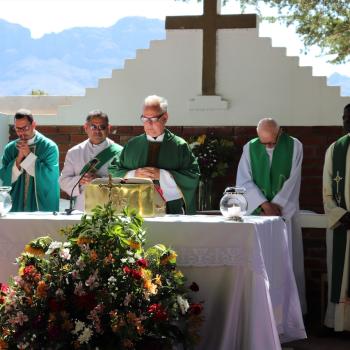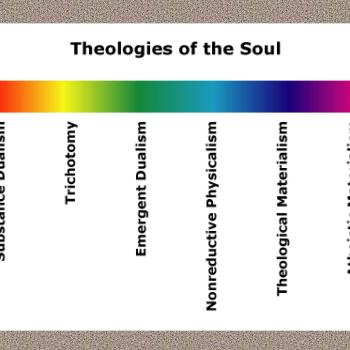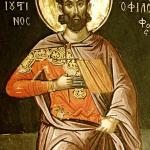Preface: The following post is adapted from an article I wrote for the quarterly newsletter of the Solanus Casey Region of the Secular Franciscan Order. Last month I was named the regional chair of JPIC: Justice, Peace and Integrity of Creation. This is a ministry shared by all branches of the Franciscan family. It is an expression of the incarnational theology of St. Francis of Assisi and for Secular Franciscans, flows naturally out of our rule:
Let them individually and collectively be in the forefront in promoting justice by the testimony of their human lives and their courageous initiatives. Especially in the field of public life, they should make definite choices in harmony with their faith. (Chapter 15, OFS Rule)
This article was intended, if you will, as my calling card to the local fraternities I will be working with. However, after the fact I was struck by the connections to a suggestion made by our frequent commentator Jordan (thank you!) in response to my recent post on critics of Pope Francis:
Perhaps it is time for Catholic social teaching oriented American Catholics to move away from directly refuting prominent politically conservative Catholics in the think-tanks, on Capitol Hill, and elsewhere. Pope Francis , in his Evangelii Gaudium, offers a new slate on which to draw an alternate political philosophy based not on social Darwinism but a Christlike attention to the least among us.
We who subscribe to comprehensive CST and its realization in American life must develop a way to succinctly and convincingly explain why CST is not socialism. In his new exhortation, Pope Francis has already developed a sophisticated argument for CST as a life-giving and life-affirming political way which intrinsically respects human beings and humanity.
While I had not articulated it in these terms, I think this describes quite well what I set out to do:
===============================
I want to begin with a quote from Dom Helder Camara the bishop of Recife, Brazil, from 1964 to 1985, a period that coincided with a repressive dictatorship in Brazil. Reflecting on his interaction with the ruling class, he said,
“When I give food to the poor, they call me a saint. When I ask why they are poor, they call me a communist.”
His question—why are they poor?—is an important one: it lies at the heart of Catholic Social Teaching. It makes us distinguish between charity and justice and helps us see in the poor their dignity as human beings created in the image of God. It leads us to seeing the poor as our brothers and sisters in Christ: because of this bond we must ask (as we would ask about our own family) why they are afflicted by poverty, hunger, disease and oppression.
This question, and questions like it, terrified the dictatorship in Brazil, in Chile under Pinochet, and in South Africa under white minority rule. Many of the people who led these governments or profited from their rule saw themselves as good Christians and they were personally generous to the poor. But to honestly answer the question of why there were so many poor would call into question their own privilege and power. It would expose the foundations of their society to the light of Christ (1 Cor 4:5), and they were afraid of what they would see.
As Catholics it is our responsibility to ask this question and to look unflinchingly at the answers. The Church first began asking itself this question in the 19th century. Pope Leo XIII in his encyclical Rerum Novarum studied a world that was growing rich from the industrial revolution, but whose wealth was hoarded by a few. He asked why so many working men and women were poor; his answer was to place the blame squarely on unjust social structures:
[W]e clearly see…the misery and wretchedness pressing so unjustly on the majority of the working class….[I]t has come to pass that working men have been surrendered, isolated and helpless, to the hardheartedness of employers and the greed of unchecked competition…. [T]he hiring of labor and the conduct of trade are concentrated in the hands of comparatively few; so that a small number of very rich men have been able to lay upon the teeming masses of the laboring poor a yoke little better than that of slavery itself.
Since then the Church has repeatedly asked itself the question, Why are they poor? It does so because, as the Father of Vatican II put it, “the Church has … the duty of scrutinizing the signs of the times and of interpreting them in the light of the Gospel” (Gaudium et Spes, 4). And every time, the Church has answered that the blame lies in unjust social structures that place ideology—whether communism or capitalism—before the good of human beings. Pope John Paul II made this point forcefully:
[T]he tension between East and West is … between two concepts of the development of individuals and peoples both concepts being imperfect and in need of radical correction.…This is one of the reasons why the Church’s social doctrine adopts a critical attitude towards both liberal capitalism and Marxist collectivism. (Sollicitudo Rei Socialis, 21)
This answer has not been popular, particularly when the Church criticizes capitalism. Bishop Camara was called a communist; more recently, Rush Limbaugh denounced Pope Francis’ apostolic exhortation Evangelii Gaudium as “pure Marxism coming out of the mouth of the Pope” precisely because the Pope was again trying to answer the question, Why are they poor?
The challenge for us as Catholics and Secular Franciscans is, as St. Ignatius Loyola put it, to think with the Church. We are called by our rule to “make definite choices in harmony with [our] faith” (OFS Rule, Chapter 15). We need to ask ourselves, in our own time and place, why are they poor? And we need to reflect and act upon the answers given by the Church and rooted in the gospel.
=========================
My next step as JPIC chair is to go out to the local fraternities and engage with them on this very question: why are they poor? However, at the moment I am somewhat at a loss as to how to proceed. Executing my responsibilities as JPIC chair clearly involves questions of adult pedagogy—something I have discussed (and criticized) in several previous blog posts (see here, here and here)—so I am aware that simply going out and lecturing on Catholic Social Teaching, complete with copious quotes from papal encyclicals is not sufficient, and indeed may not be effective. Yes, I started that way, in writing, but this was more of an attempt to position myself and my approach to this ministry, and less of an attempt to persuade.
Further, I am conscious of another trap that I am in danger of falling into: believing, consciously or unconsciously, that I have “The Answers (c)” and it is my duty as an enlightened Catholic to bring the truth to the benighted masses. The temptation to do this is doubly strong since I am an academic and most of my confreres are not, and since I am probably more progressive (for want of a better term) politically and theologically than they are. This is not universally true and I am conscious of many variations and combinations that are quite surprising (or were to me when I first met these people). Nevertheless, as a first approximation it is a reasonable generalization.
Paolo Freire, in his book Pedagogy of the Oppressed, described this temptation well:
[T]hese adherents to the people’s cause constantly run the risk of falling into a type of generosity as malefic as that of the oppressors. The generosity of the oppressors is nourished by an unjust order, which must be maintained in order to justify that generosity. Our converts, on the other hand, truly desire to transform the unjust order; but because of their background they believe that they must be the executors of the transformation. They talk about the people, but they do not trust them; and trusting the people is the indispensable precondition for revolutionary change. A real humanist can be identified more by his trust in the people, which engages him in their struggle, than by a thousand actions in their favor without that trust.
Realizing the existence of this temptation is the first step in over-coming it. And this realization has also convinced me that any pedagogical approach that I take must be grounded in the experience and understanding of my listeners: they have a wisdom that must be respected and built upon. My confreres may not have read or fully thought through the implications of Catholic Social Teaching, but they have each lived out their baptismal faith and their dedication to the Franciscan charism in manifold ways, often with a quiet sanctity that I am in awe of.
But, at the same time, they often accept uncritically definitions and tropes propagated by the secular world that are at odds with their faith. It is into the gap between these two realities that I need to go, and in terms of practical steps to take, I am at a loss. So I would welcome suggestions and discussion on this very point.
















